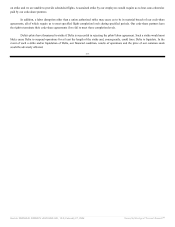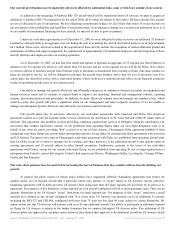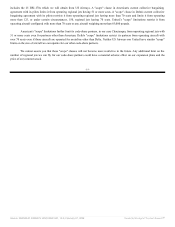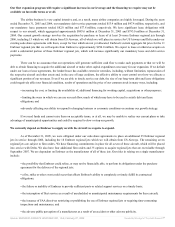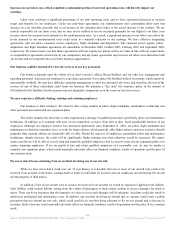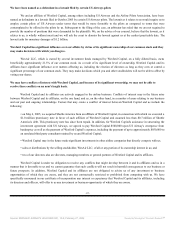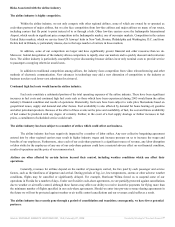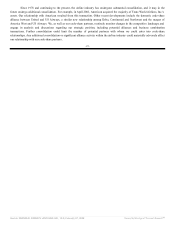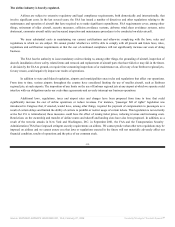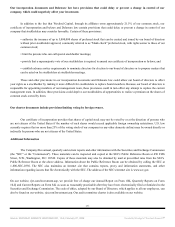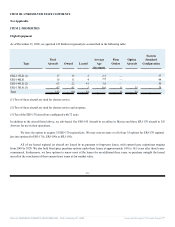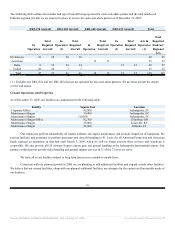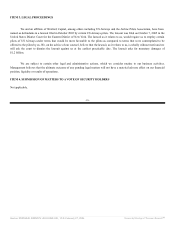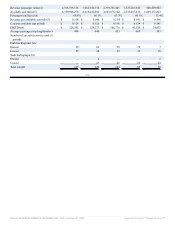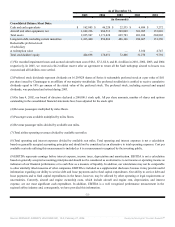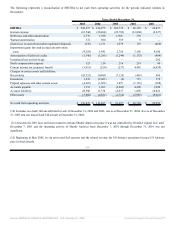Frontier Airlines 2005 Annual Report Download - page 44
Download and view the complete annual report
Please find page 44 of the 2005 Frontier Airlines annual report below. You can navigate through the pages in the report by either clicking on the pages listed below, or by using the keyword search tool below to find specific information within the annual report.
The airline industry is heavily regulated.
Airlines are subject to extensive regulatory and legal compliance requirements, both domestically and internationally, that
involve significant costs. In the last several years, the FAA has issued a number of directives and other regulations relating to the
maintenance and operation of aircraft that have required us to make significant expenditures. FAA requirements cover, among other
things, retirement of older aircraft, security measures, collision avoidance systems, airborne wind shear avoidance systems, noise
abatement, commuter aircraft safety and increased inspection and maintenance procedures to be conducted on older aircraft.
We incur substantial costs in maintaining our current certifications and otherwise complying with the laws, rules and
regulations to which we are subject. We cannot predict whether we will be able to comply with all present and future laws, rules,
regulations and certification requirements or that the cost of continued compliance will not significantly increase our costs of doing
business.
The FAA has the authority to issue mandatory orders relating to, among other things, the grounding of aircraft, inspection of
aircraft, installation of new safety related items and removal and replacement of aircraft parts that have failed or may fail in the future.
A decision by the FAA to ground, or require time consuming inspections of or maintenance on, all or any of our Embraer regional jets,
for any reason, could negatively impact our results of operations.
In addition to state and federal regulation, airports and municipalities enact rules and regulations that affect our operations.
From time to time, various airports throughout the country have considered limiting the use of smaller aircraft, such as Embraer
regional jets, at such airports. The imposition of any limits on the use of Embraer regional jets at any airport at which we operate could
interfere with our obligations under our code-share agreements and severely interrupt our business operations.
Additional laws, regulations, taxes and airport rates and charges have been proposed from time to time that could
significantly increase the cost of airline operations or reduce revenues. For instance, "passenger bill of rights" legislation was
introduced in Congress that, if enacted, would have, among other things, required the payment of compensation to passengers as a
result of certain delays and limited the ability of carriers to prohibit or restrict usage of certain tickets. This legislation is not currently
active but if it is reintroduced, these measures could have the effect of raising ticket prices, reducing revenue and increasing costs.
Restrictions on the ownership and transfer of airline routes and takeoff and landing slots have also been proposed. In addition, as a
result of the terrorist attacks in New York and Washington, D.C. in September 2001, the FAA and the Transportation Security
Administration (TSA) have imposed stringent security requirements on airlines. We cannot predict what other new regulations may be
imposed on airlines and we cannot assure you that laws or regulations enacted in the future will not materially adversely affect our
financial condition, results of operations and the price of our common stock.
-24-
Source: REPUBLIC AIRWAYS HOLDINGS INC, 10-K, February 27, 2006 Powered by Morningstar® Document Research℠


